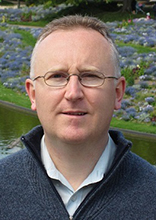of Victoria
EngineeringNavigation

MASc, PhD, P.Eng
Biophysical economics, deep decarbonisation, sustainable cities, industrial ecology
I have worked for over 20-years on strategies for addressing global climate change, drawing upon economics, technology, policy and industrial ecology perspectives. Much of my current work involves biophysical analysis of economies towards deep decarbonization. My previous research helped the development of a standard approach for city-wide greenhouse inventorying – as well as mitigation strategies. Holding qualifications in civil engineering, economics and business, I have conducted consulting work on sustainable infrastructure and cities for several national governments, as well as the World Bank and others. In 2011/12, I was seconded to the OECD in Paris, to work on Cities, Green Growth and Policies for Encouraging Investment in Low Carbon Infrastructure. I have been a visiting professor at Oxford University and ETH Zürich. I previously served as President of the International Society for Industrial Ecology. I am also a Senior Fellow at the Global Cities
Avoiding Investment in Fossil Fuel Assets
The Great Depression was caused by an Energy Transition
Energy Transitions - Learning from the Great Depression
I am developing new biophysical methods, from first principles, that assist governments to move economies towards deep decarbonization. Central to these methods is understanding of the mutualistic relationship between energy use and capital accumulation in economies.
I continue to work on planning and investment strategies for the global development of sustainable infrastructure systems. This builds on work first developed at the OECD (below) that was published in Energy Policy and recently applied to China. Related to this research, I co-authored an article in Nature on peak waste.
Building on studies of the metabolism of megacities (below) we are examining the potential for wide-scale electrification of cities, using low-carbon power sources. For this work, we partnered with the World Resources Institute and published in outlets including Journal of Urban Technology and Current opinion in environmental sustainability.
This research also identified a key threshold for the carbon intensity of electricity supply which supports low carbon growth (published in Nature Climate
In partnership with the Enel Foundation, I led a group of 28 researchers in a study of the energy and material flows of the world’s 27 megacities. The sheer magnitude of these flows (e.g., 9% of global electricity, 10% of gasoline, 13% of solid waste) showed the importance of megacities in addressing global environmental challenges. Our work was published in the Proceeding of the National Academy of Sciences and picked up by several media outlets
Building upon studies of urban metabolism, I led a group of international scholars to investigate how and why greenhouse gas (GHG) emissions differ between global cities. Our work was published in Environmental Science &
In 2011-12, I was seconded to the Organisation for Economic Co-operation and Development (OECD) in Paris. At OECD, I primarily supported the Working Party on Climate, Investment and Development (which has delegates from the 34 OECD countries, including Canada). I led one paper and contributed to a second, both concerned with policies for encouraging increased private sector investment in low carbon, climate resilient
In 2010, the Sustainable Infrastructure Research group produced a quantitative guidebook to help Canadian municipalities understand and reduce their greenhouse emissions. The Guide was produced in collaboration with Toronto Region Conservation and partner municipalities in the Greater Toronto Region. A chapter of the book on best practices was published by the World Bank.
Over several years I conducted research on urban metabolism including the first comparison of worldwide city metabolism. I have helped several organizations develop programs to use urban metabolism for environmental reporting, including Toronto Region Conservation, The World Bank, and UCLA / California Energy Commission.
A variety of earlier projects included work on green buildings, neighbourhood metabolism, urban water systems and sustainable urban transportation, using methods of life cycle assessment and material flow analysis.